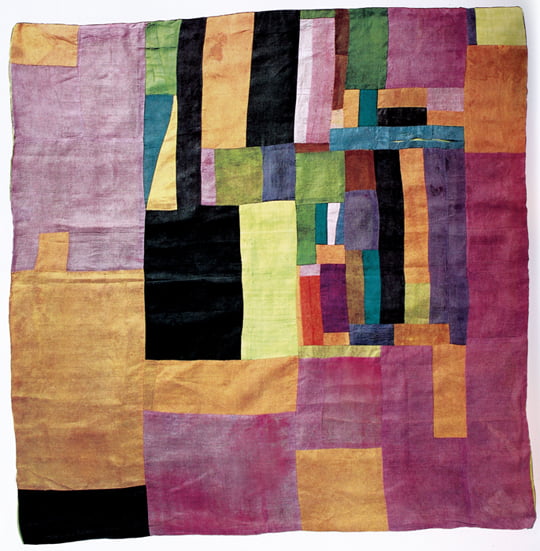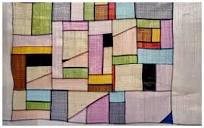A Letter from Unzu Lee, serving as Regional Liaison for East Asia
Spring 2022
Write to Unzu Lee
Individuals: Give online to E132192 in honor of Unzu Lee’s ministry
Congregations: Give to D500115 in honor of Unzu Lee’s ministry
Give online: pcusa.org/unzu-lee
Subscribe to my co-worker letters
Dear companions on my journey,
Greetings from Korea! It has been a little over a year since I left the States. Before I left, I basically emptied out my storage unit except for a very few items. One item I kept was a patchwork blanket made by my late maternal grandmother. It is one of the many blankets she made using the fabric scraps brought to her by her friends who worked at garment factories in LA. None of them are fancy, but each one was sown with love.
Jo-gahk-bo literally means a patchwork cloth in Korean and is usually used to wrap items in a bundle to carry or to cover food. Like my grandmother, Korean women traditionally made Jo-gahk-bo using leftover fabric scraps. Thus, one may never know where each piece came from, which means each piece has its own history.
The National Council of Churches in Korea (NCCK) is PC(USA)’s historical partner and is the partner entity with which I work most closely for Korea peace. In addition, I am making connections with some other peace groups, and Jo-gahk-bo is one of them. Organized with an intent to contribute to the women’s peace movement, Jo-gahk-bo brings together women of Korean diasporic communities who currently make their home in South Korea. They come from China, North Korea, Japan, and different parts of the former Soviet Union. When they gather, they engage in storytelling and deep listening. Ms. SookIm Kim, the founder of Jo-gahk-bo, observes that she has seen among women tremendous growth in their capacity to empathize with those who are different from them.
Like the pieces of fabric that make up the Jo-gahk-bo, each woman has her unique story. On Jo-gahk-bo’s 10th anniversary, it published a collection of stories told by 12 women under the title of Herstories: Life Stories of Korean Women of Diaspora. As I read their life stories, it became apparent that their personal ‘her’ stories are inescapably bound to Korean national history. Just so that you can catch a glimpse of this reality, let me share a little bit of Lee, Jung Hee’s story.Jung Hee was born on an island north of the Japanese archipelago called Hwa-tae in Japanese. Her father, a young farmer in Korea, was brought to Hwa-tae in 1936 by the Japanese to work in its coal mines. Eventually, the woman who became his wife and his entire family, except for his married sister joined him in Hwatae, although the living conditions were extremely harsh. They eked out a living by cultivating pieces of unclaimed land in Hwatae.
When Japan declared defeat to the Allied Forces in August 1945, Japan lost Hwa-tae to the Soviet Union, and the Korean residents of Hwa-tae lost their Japanese citizenship. The Japanese government brought the Japanese residents of Hwa-tae back to Japan, but not the Koreans. According to Jung Hee, Koreans believed wholeheartedly that Japan would send them a ship that would take them back to Korea, but such a ship never arrived. So, Koreans became stateless residents of Hwa-tae, now called Sachalin in Russian, and were involuntarily exiled in the Soviet Union. The people of their homeland, Korea, did not come to their rescue because the two allied forces to whom Japan surrendered divided Korea into two along the 38th parallel. The northern part was controlled by the Soviet Union, and the southern part was controlled by the U.S. occupation army military government until Koreans on both sides ended up establishing two separate republics in 1948 against the wishes of many Koreans who wanted a unified Korea.
Then, the Korean War broke out, and its open conflict came to an end only when an armistice agreement was signed by the U.S., North Korea, and China on July 27, 1953. North Korea then sent its diplomats to Sachalin, now a part of the Soviet Union, and many Koreans in Sachalin, including Jung Hee’s family, who so very much wanted to return home, obtained North Korean citizenship even though they were from the southern part of Korea. Most of the Koreans, like Jung Hee’s parents, have since died in Sachalin even though their home in Korea is reachable by air in less than three hours. This is all because Korea is still divided, and the Korean War has not ended.
The Korea Peace Appeal (KPA) is a global campaign to change this situation by replacing the armistice agreement with a peace agreement. Its goal is to collect 100 million signatures worldwide by July 27, 2023, which will mark the 70th anniversary of the armistice agreement. For the sake of Jung Hee and all Koreans suffering from the Korean division and war, please add your name to this campaign. Go to https://en.endthekoreanwar.net/, sign, and enter your affiliation as PC(USA). Please invite your family, friends, and church members to do the same. We want many Presbyterians to be among that number! Also check out the Presbyterian Korea Peace Appeal webpage at presbyterianmission.org/ministries/peacemaking/korea-peace-appeal/
In September, I plan to attend the Ecumenical Forum for Korea in Germany and then go to the United States for my Interpretation Assignment. Because my presbytery is in New Jersey, I plan to stay in New Jersey for about a month, beginning on September 17, 2022. If you are in the area and want me to come to speak to your congregation, PW group, youth group, etc., please feel free to contact me at unzu.lee@pcusa.org.
“For he is our peace; in his flesh he has made both into one and has broken down the dividing wall, that is, the hostility between us” (Ephesians 2:14, NRSV).
May it be so.
Faithfully, Unzu
![]() You may freely reuse and distribute this article in its entirety for non-commercial purposes in any medium. Please include author attribution, photography credits, and a link to the original article. This work is licensed under a Creative Commons Attribution-NonCommercial-NoDeratives 4.0 International License.
You may freely reuse and distribute this article in its entirety for non-commercial purposes in any medium. Please include author attribution, photography credits, and a link to the original article. This work is licensed under a Creative Commons Attribution-NonCommercial-NoDeratives 4.0 International License.

